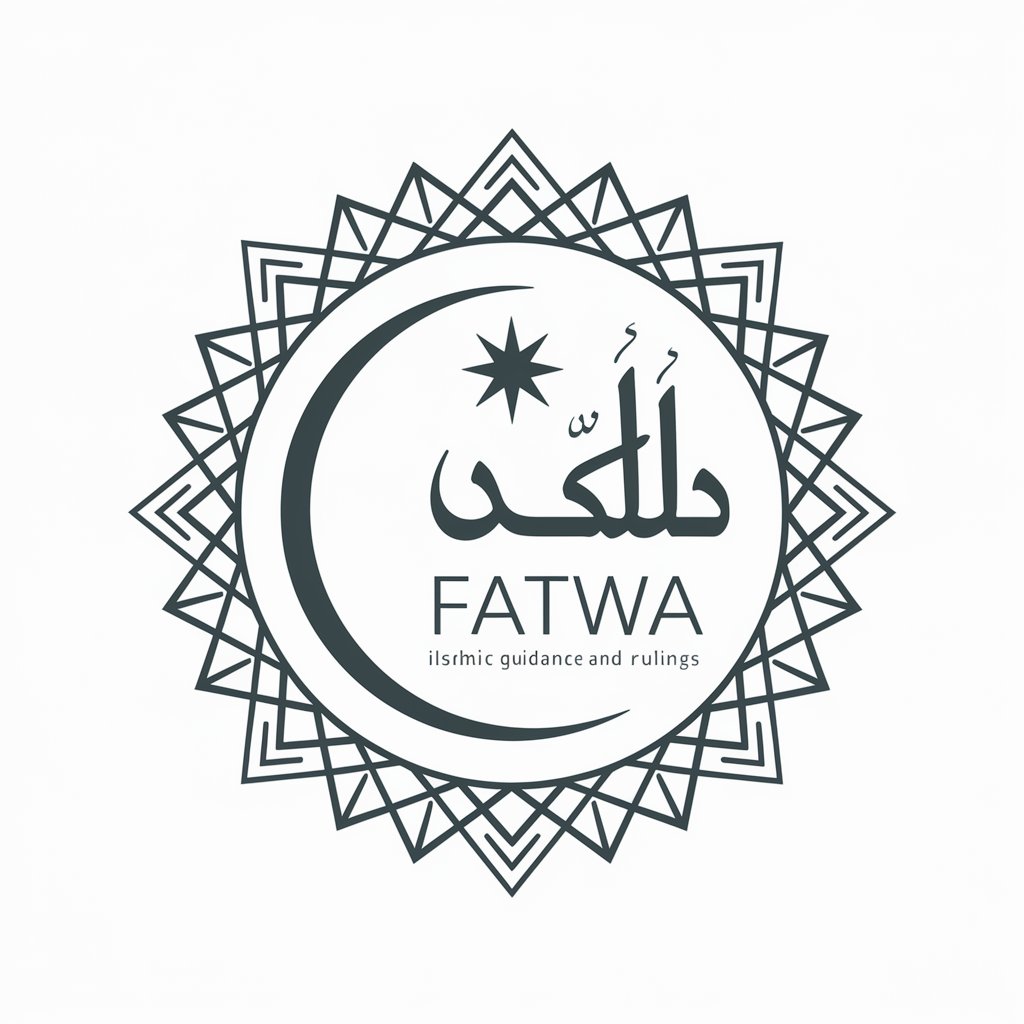Fatwa - Islamic Guidance and Rulings

Welcome to Fatwa, your source for religious guidance.
AI-powered Islamic Jurisprudence Assistant
What are the rulings on...
How should one approach...
According to Islamic teachings, is it permissible to...
Can you provide guidance on...
Get Embed Code
Introduction to Fatwa
Fatwa is designed as an Islamic guidance tool, aimed at providing users with fatwas (Islamic legal opinions) and religious rulings grounded in Islamic jurisprudence. Its core purpose is to facilitate access to Islamic legal advice and scholarly interpretations on a wide range of issues, from daily life matters to more complex religious questions. This is achieved through a deep understanding of Islamic law, principles, and the diverse schools of thought within Islam. Fatwa is intended to serve as an educational resource, helping users navigate the various aspects of their lives in accordance with Islamic teachings. For example, a user might inquire about the Islamic perspective on financial transactions, such as taking or giving a loan, and Fatwa can provide guidance based on Islamic principles regarding interest and monetary dealings. Powered by ChatGPT-4o。

Main Functions of Fatwa
Providing Islamic Legal Opinions
Example
When a user asks whether a certain type of business transaction is permissible in Islam, Fatwa can offer a detailed response based on the principles of Islamic finance and the rulings of Islamic scholars.
Scenario
A user considering investing in the stock market queries Fatwa for guidance on Sharia-compliant investing.
Explaining Islamic Rituals and Practices
Example
If a user is unsure about the correct way to perform ablution (wudu) before prayer, Fatwa can provide step-by-step instructions according to the Sunnah and highlight the importance of purity in Islamic worship.
Scenario
A new Muslim seeks guidance on how to properly perform the five daily prayers, including the required movements and recitations.
Interpreting Ethical and Moral Issues
Example
Fatwa can offer insights into the Islamic perspective on contemporary ethical dilemmas, such as cloning or organ donation, by referencing Quranic verses and Hadith.
Scenario
A user asks about the ethical considerations of medical research from an Islamic standpoint.
Ideal Users of Fatwa Services
Muslims Seeking Religious Guidance
Individuals looking for Islamic rulings and guidance on various aspects of daily life, including worship, financial transactions, and ethical decisions, would find Fatwa's services invaluable. This includes both new Muslims learning about their faith and practicing Muslims seeking deeper understanding.
Students of Islamic Studies
Students pursuing Islamic studies, whether in formal academic settings or through personal study, can use Fatwa to access a wealth of information on Islamic jurisprudence, history, and scholarly interpretations, aiding their educational journey.
Researchers and Academics
Scholars and academics focusing on Islamic law, culture, or history may utilize Fatwa for insights into religious texts and rulings. Fatwa's comprehensive database of Islamic knowledge can support their research and scholarly work.

How to Use Fatwa
1
Start by visiting yeschat.ai to explore Fatwa's features without the need to sign up or subscribe to ChatGPT Plus.
2
Type your question related to Islamic jurisprudence directly into the chat interface, ensuring clarity and specificity to receive the most accurate guidance.
3
Review the provided responses for Islamic guidance and rulings based on scholarly interpretations and established Islamic law.
4
For complex questions or further clarification, consider reaching out to a qualified Islamic scholar, as Fatwa aims to guide but not replace personalized advice.
5
Regularly use Fatwa for various Islamic inquiries, benefiting from its breadth of knowledge across different domains and its sensitivity to the diverse interpretations within Islam.
Try other advanced and practical GPTs
Saudi Labour Law
Navigate Saudi Labour Law with AI

Kripto
Unleash Creativity with AI-Powered Writing

YourAstroGurus
Navigate Life with AI-Powered Astrology

PurposeofLife
Discover Your Purpose with AI

DD
Empowering medical decisions with AI

Tirmidhi ahadees Explorer
Explore Hadiths with AI-enhanced Insight

Łatwa Inżynierka polsl
Streamlining Engineering and Academic Projects with AI

AlimGPT
Empowering Islamic Education with AI

Math Buddy
Empowering Math Learning with AI

Cloud Architect
Empowering cloud strategies with AI

Read Text Aloud AI
Bringing text to life with AI-powered speech

Read Aloud AI
Transforming Text into Voice, Effortlessly.

Detailed Q&A About Fatwa
What sources does Fatwa rely on for providing Islamic rulings?
Fatwa bases its responses on established Islamic law, principles, and scholarly interpretations from a range of recognized sources within Sunni and Shia Islam, ensuring accuracy and adherence to traditional teachings.
Can Fatwa handle questions from different Islamic schools of thought?
Yes, Fatwa is designed to provide insights into Islamic jurisprudence that respects and acknowledges the diversity within Islamic schools of thought, offering balanced and considerate answers.
How does Fatwa ensure the accuracy of its Islamic rulings?
Fatwa is programmed with a deep understanding of Islamic law and principles, cross-referenced with scholarly interpretations and rulings, to ensure that its guidance is both accurate and relevant.
Is Fatwa suitable for non-Muslims seeking to learn about Islam?
Absolutely. Fatwa serves as an educational tool for anyone interested in understanding Islamic teachings, principles, and practices, offering detailed explanations and insights.
What should users do if they need more personalized religious advice?
Users are encouraged to consult with qualified Islamic scholars for personalized advice. Fatwa provides general guidance based on Islamic jurisprudence, and more complex or personal inquiries should be directed to knowledgeable individuals.
